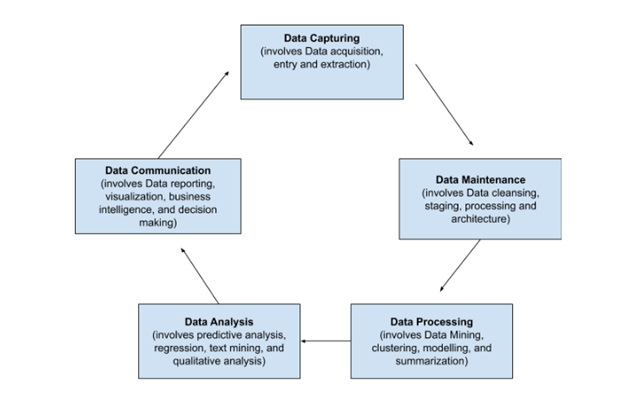|
Getting your Trinity Audio player ready...
|
With more data flowing in from various sectors of businesses and industries, it becomes imperative to adopt new-age technologies, like Data Science can help you to store, analyze, and process such data. But, to understand what is Data Science, its meaning, and its definition, let us first understand what “data" is.
Data Explained
Data is the set of quantitative and qualitative variables that can or cannot be translated into an efficient form for processing. Data can be :
Structured – the data is organized in patterns and can be easily searched from relative databases. An example of structured data can be an employee database where the data is organized in a standardized format.
Unstructured – the data is highly unorganized and cannot be searched easily. Examples of unstructured data can be data collected from emails, chatrooms, videos, images, etc lack any structure or form making it difficult and time-consuming to analyze and process.
Data Science Meaning & Definition
Data Science is a multi-disciplinary field of scientific methods, algorithms, and technology that uncover knowledge and insights from structured and unstructured data. It involves the mining of granular data by understanding complex behaviors and patterns and discovering hidden insights that help organizations in a smarter decision-making process.
To mine the data for insights, data exploration has to be done. Data scientists try to understand and analyze the patterns hidden to derive value from the data. Based on the client’s data and requirements, they adopt a variety of techniques like anomaly detection, clustering analysis, regression analysis, classification analysis, etc to understand and interpret the data.
The Data Science Life Cycle
To extract useful information, data scientists implement the data science life cycle and acquire actionable insights to gain maximum returns for their organizations.
Data Science Benefits
Organizations enlisting and imbibing Data Science into their processes will
- Be able to increase their profitability through a better data-driven decision-making ability
- Improvise operational efficiency and workflows
- Personalize, refine, and target marketing and advertising campaigns
Specific benefits of Data Science depend upon the specific goals of the organization and the industry to which it belongs. For the banking sector, the main benefits derived from data science are early detection of frauds and assessment of risks, whereas, the retail sector can gain profits with an increase in conversion rates and targeting the marketing campaigns to specific segments of customers.
It is crucial for any industry to adopt Data Science, leverage it into its processes, and reap benefits from them.
If you need any help with idea validation, proof-of-concept, Data Science consulting, large-scale AI implementation, Big Data Engineering, or a creative solution for your business. You are at the right place.
Talk to our experts


